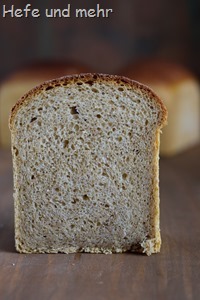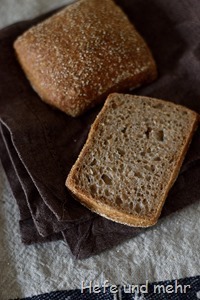 I got a bit to optimistic when I tried the first version of this bread. Adding a big portion of very ripe pâte fermentée was not the best of my ideas, as this brings to much enzymes in the dough and has the same effect like adding sourdough. After 24 hours proofing time the dough was still stable, but the resulting bread lacked volume. A sure sign that the gluten network already started to decline.
I got a bit to optimistic when I tried the first version of this bread. Adding a big portion of very ripe pâte fermentée was not the best of my ideas, as this brings to much enzymes in the dough and has the same effect like adding sourdough. After 24 hours proofing time the dough was still stable, but the resulting bread lacked volume. A sure sign that the gluten network already started to decline.
And so I put the recipe back on my worktable and sat down to write a better version. This time it is a straight dough which develops its flavour during the long fermenting time. Yoghurt and good portion of whole grain flour adds another aromatic notes to the loaf. In this combination, the dough is stable over the course of 24 hours and the breads have a nice volume. Which can be seen in their crumb, too. It is soft and fluffy and can be toasted very well, too! A perfect bread for breakfasts and lunch boxes!




 Some Weeks ago a reader send me a recipe asking if I could change it to less yeast and with the possibility to let the rolls proof overnight in the fridge. The recipe was – to use the famous words of Alfred Biolek – “interesting” as it contained not only a lot of yeast but baking powder as well. So it was not very surprisingly that the recipe yielded roll which taste not so good and get stale very fast.
Some Weeks ago a reader send me a recipe asking if I could change it to less yeast and with the possibility to let the rolls proof overnight in the fridge. The recipe was – to use the famous words of Alfred Biolek – “interesting” as it contained not only a lot of yeast but baking powder as well. So it was not very surprisingly that the recipe yielded roll which taste not so good and get stale very fast.
 A short look through the kitchen cupboards produced a open glass of yoghurt, some boiled potatoes form our Lunch and a leftover of whole rye flour. Together with a little spoonful of sourdough (a idea I copied from Günther Weber) I kneaded them to a dough and let them rise over night. The next morning I formed and baked some rolls from this dough which rose highly while we splept.
A short look through the kitchen cupboards produced a open glass of yoghurt, some boiled potatoes form our Lunch and a leftover of whole rye flour. Together with a little spoonful of sourdough (a idea I copied from Günther Weber) I kneaded them to a dough and let them rise over night. The next morning I formed and baked some rolls from this dough which rose highly while we splept.

